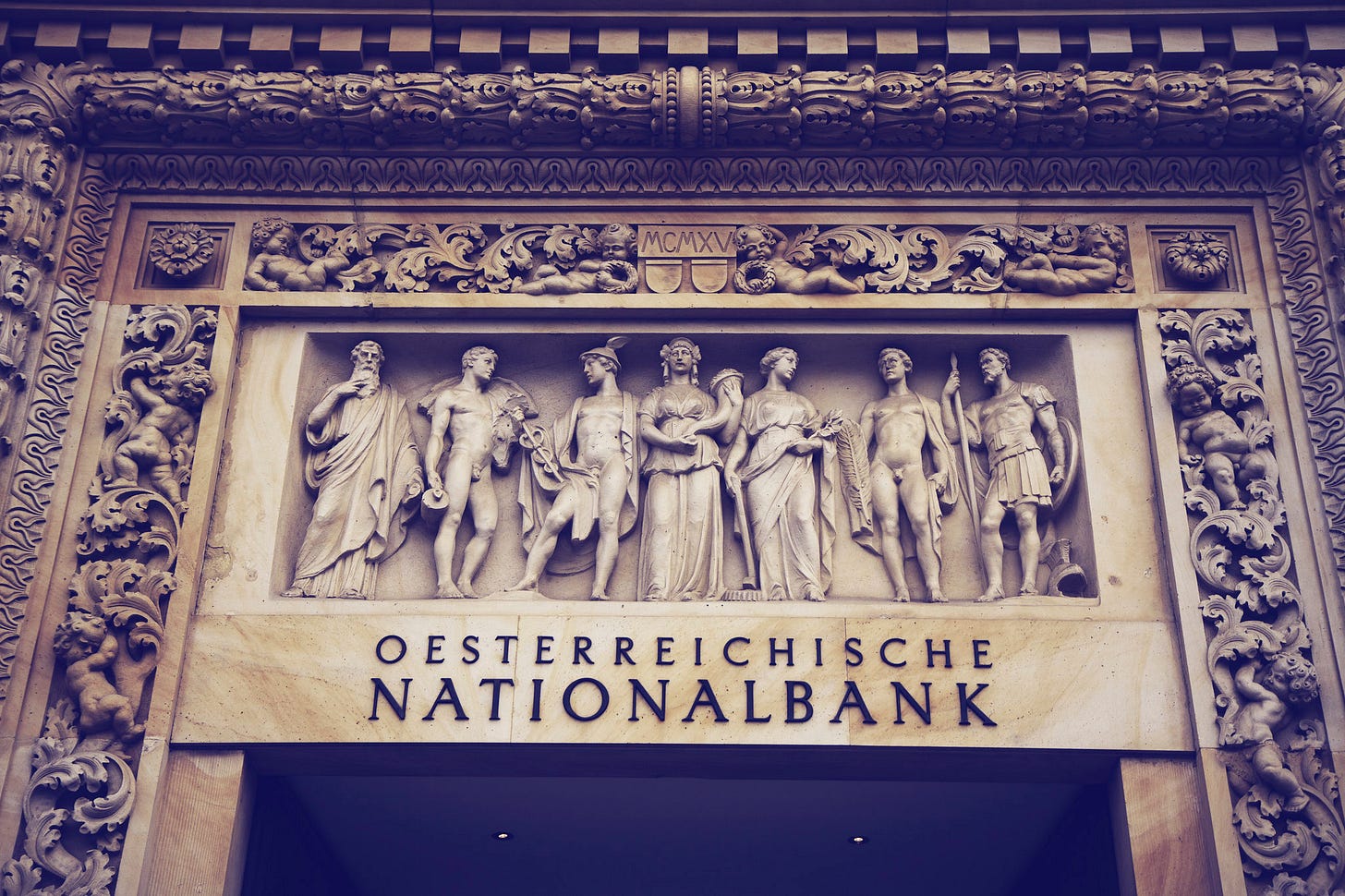Cashing Up
Austria's National Bank believes that the country's rising budget deficits will mean the next government will have to make spending cuts
Servus!
June is coming to an end and the European summer break is about to begin. It is always at this time of year that a great emptying of Vienna takes place. The Viennese (who can afford it) retreat to their second homes in the countryside or take long, languorous summer vacations, with their absence in the city’s coffeehouses and on public transport filled by tourists from abroad. Among those fleeing on July 1 will be the nation’s politicians. Out in the provinces, after all, there are towns and villages to be visited, trails to be hiked, photographs to be taken, hands to be shaken—and votes to be won. This year, holiday season is election season.
The battleground on which the election will be fought is starting to become clear. Immigration will play a central role to the extent that the far-right Freedom Party (FPÖ) remains ahead in the polls and the conservative People’s Party (ÖVP) and, to a lesser extent, the center-left Social Democratic Party (SPÖ) will be looking to use the issue to imitate them and poach their voters. Environment minister Leonore Gewessler’s vote in favor of the European Union’s Nature Restoration Law last week against the wishes of the Greens’ coalition partners indicates the party wishes to use the environment and climate change to sure up its base so as not to lose left-liberal voters to the SPÖ, the Communist Party (KPÖ), or the emergent Beer Party.
Ultimately, however, the state of the economy is going to shape everything. On Monday, the Austrian National Bank published its financial stability report, which didn’t make for pretty reading—at least in the short term. 2023 was a period of economic contraction for Austria, with GDP falling by 0.7 percent in real terms. “This was due to persistently high inflation, the very weak external economic environment, and the resulting poor sentiment,” the bank said, challenges all brought on by the international supply side crisis and Russia’s invasion of Ukraine, which beget rising inflation.
2024 doesn’t look much better either. The bank projects a mere 0.3 percent increase in GDP this year, while unemployment is set to tick up from 6.4 percent in 2023 to 6.7 percent in 2024—not a lot, but enough to unsettle consumers potentially. Because of the recession into which Austria fell in 2023 and deficit spending necessitated by the COVID-19 pandemic and the twin inflationary and energy crises of 2022/23, Austria’s budget deficit will hit 3.1 percent this year—slightly over the 3 percent limit demanded by the EU’s stringent Maastricht criteria.
2025 and 2026 offer the prospect of a return to normality, the bank thinks, as inflation comes down and the economic conditions in Austria’s neighborhood improve, but in the immediate, “persistently weak economic growth and prolonged geopolitical conflicts continue to pose major challenges.” This is true for Austria’s banks—as “increased credit risks will likewise put pressure on banks’ profitability”—the manufacturing and construction sectors, and the country’s politicians as they start to sketch out their election manifestos.
The economist Christoph Badelt, head of the national bank’s Fiscal Advisory Council, has said the next Austrian government is going to have to find savings to bring down Austria’s budget deficit and national debt. This will be music to the ÖVP’s ears, which has previously sought to pursue a balanced budget policy and would be all too happy to introduce spending cuts (in part to pay for the tax cuts it has introduced during the life of their current coalition with the Greens). A reduction in unemployment benefit has already been floated by the party. Less government spending, however, will also mean less government investment, which in the context of climate change, the war in Ukraine, and the ongoing re-calibration of the global economy could see Austria fall behind. The last thing Austria would want is to become another Germany, which has spent a decade pursuing a punitive budget policy while letting their infrastructure and industrial base crumble.
Bis bald!
Thank you for subscribing to the Vienna Briefing. Every recommendation helps, so if you know someone who might be interested in reading this newsletter, consider sharing it with them today.
The Vienna Briefing is a reader-supported publication made possible by your donations. If you would like to contribute to my work, think about sending me a tip.
Austria On Top
Austria have qualified for the knockout stages of this year’s European Football Championships in Germany after beating The Netherlands 3-2 in Berlin, winning Group D in the process. In their previous two group games, Austria lost to France 1-0 in Düsseldorf before coming back to defeat Poland 3-1 in the German capital.
Political Islam
The Islamic Party, a new political party founded in Wiener Neustadt, intends to compete in this September’s parliamentary elections campaigning for the “rights and religious interests of Muslims in Austria.” Ramazan Mutlu, who was named as the party’s treasurer, has already distanced himself from the widely-criticized initiative.
Private Practice
Hospital doctors should no longer be allowed to work part-time in a public hospital while running their own private practice on the side, Vienna’s health secretary Peter Hacker has proposed. His idea has been shot down by the Austrian Medical Association as well as legal experts who believe the idea violates EU labor law.




